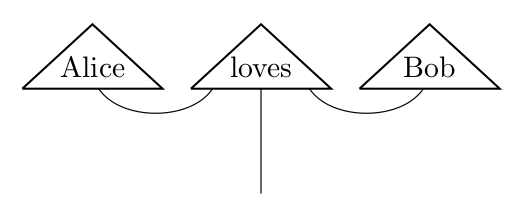discokitty

An educational implementation of the DisCoCat framework as described
in "Mathematical Foundations for a Compositional Distributional Model
of Meaning" (link) by Coecke,
Sadrzadeh and Clark.

Sunglasses Kitty
by Rikki Lorie, licensed under Creative Commons
Usage example
Please note that this library is work in progress and it is possible
that substantial changes will be made. In the following example we
work in the category of relations declaring the meaning and grammar
type of some words and then we evaluate an example sentence.
module Discokitty.Examples.AliceAndBob where
import Discokitty
import Discokitty.Models.Diagrams
import Discokitty.Models.Rel
-- We first declare an universe with all the possible basis words,
-- both nouns and sentences. The rest of the types are parameterized
-- by this universe.
data Universe = Alice | Bob | IsTrue | IsFalse deriving (Eq, Ord, Show)
-- We choose to use the category of relations for this example, and we
-- declare a term to be a word in the category of relations for our
-- given universe.
type Term = Words (Rel Universe)
-- We give meaning to some terms. Relations are described as subsets using
-- "relation", and the Lambek grammatical type must be written at the end.
alice :: Term
alice = Words
{ meaning = relation [ [ Alice ] ]
, grammar = [N]
, text = "Alice"
}
bob :: Term
bob = Words
{ meaning = relation [ [ Bob ] ]
, grammar = [N]
, text = "Bob"
}
loves :: Term
loves = Words
{ meaning = relation [ [ Alice , IsTrue , Bob ] ]
, grammar = [ L N , S , R N ]
, text = "loves"
}
-- In our example sentence, we evaluate "Alice loves Bob".
-- This produces the following output:
-- > [[IsTrue]] of grammar type [S]
example :: [Term]
example = sentence [alice , loves , bob] @@@ [S]
-- We can also generate Tikz diagrams.
exampleDiagram :: String
exampleDiagram = tikzDiagrams [alice , loves , bob]
The generated tikz diagram looks as follows.





